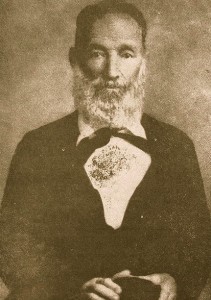This is the third and final blog on lessons we can learn from Christian missionaries and evangelists who did not become famous (on earth).
 One day in the late 19th Century, a child was bitten by a rattlesnake and the family sent for a local preacher to come and pray for the child. His prayer went like this:
One day in the late 19th Century, a child was bitten by a rattlesnake and the family sent for a local preacher to come and pray for the child. His prayer went like this:
O Lord, we do thank thee for rattlesnakes. If it had not been for a rattlesnake they would never have called upon you. Send a rattlesnake to bite Bill, and one to bite John, and send a great big one to bite the old man…
That local preacher was Robert Sheffey. I suspect we would have become good friends.
Out of the three people we have looked at over the past few weeks (Sam Pollard and Johanna Veenstra being the other two), Sheffey is probably the least known. He was not intelligent by the world’s standards, he was not rich and I don’t think he was always right. However, Sheffey’s life has intrigued me for many years—and although I could write many blogs on him, I’ll only inflict you with one. Here’s three particular things about Sheffey that stand out:
1. Fearless prayer
On one of his many horseback journeys through the Virginian mountains, Sheffey came to see the despair that illegal whisky distilling was bringing upon poor families. After hearing one sad case, he got on his knees there and then (as he was known to do) and prayed that the Lord would cause an oak tree to fall on the distilling equipment. Sheffey then left, equipment in tact and much scorn following him. It was only a few days later, when he met the family again, that he learned how that night a great storm had caused a tree to fall and had destroyed everything used to make whisky.
I’m not arguing here about whisky-making, or alcohol, or even God answering prayer. The point is that Sheffey was known as a man who was not afraid to pray in faith. And even when God didn’t answer immediately—or at all—his faith did not waver. He knew God had heard his prayer, and that was enough.
2. A good wife
Robert Sheffey was married twice, and it is clear that he loved both of his wives deeply. After Elizabeth died, he married Eliza Stafford in 1864. Commenting on his second marriage following the birth of their first child, Sheffey’s biographer Jess Carr said “Robert thought that the infant and his mother were the most beautiful people a loving God had ever made.”1
His love for her was more than skin-deep, however. She was his faithful companion at home and in ministry. She prayed for him, supported him and took care of his correspondence, allowing him to spend more time preaching. For a man who was famous for his praying, having a praying wife must have been a great gift indeed.
Am I saying go get married? Nope. Just make sure that when you do you pick a good ‘un.
3. Humour
You might be surprised to see this point. It has to be said that sometimes Christian are frighteningly glum and boring. Humour is perhaps mistakenly seen as a worldly thing. Now—if it’s dirty or nasty, then it is worldly. But it doesn’t need to be. Sheffey certainly liked a good laugh.
On one occasion when out for a meal at another family’s home, Robert asked the mother of the house if she had forgotten to put the dumplings on the table. She replied that she did not often make dumplings. Robert proceeded to give thanks for the food:
“Oh Lord, we thank Thee for this good man and this good woman and their sweet fine children. We thank Thee for this good chicken, but even Thou knowest how much better it would have been with dumplings. Amen.”2
When you read the story of his whole life, you’ll understand that Sheffey was not being facetious. He simply loved people and he loved to make them smile. I wonder sometimes do we become so hyper-spiritual that we forget to carry a smile? Make someone laugh, show them that you’re happy. And when they ask why—tell them about Jesus (1 Peter 3:15).
In Conclusion
I’ll finish with one story which shows the best of all three points:
Going through the mail one day with Eliza, Sheffey came across a letter from a girl wanting him to pray that she could marry a particular man she thought would make a suitable husband. He told Eliza to respond and “tell that girl…she can have the man she wants.” Then he paused, and decided he wanted to meet the two of them first. His reason? Sheffey continued… “I want to know what I might be praying that young man into!”3
